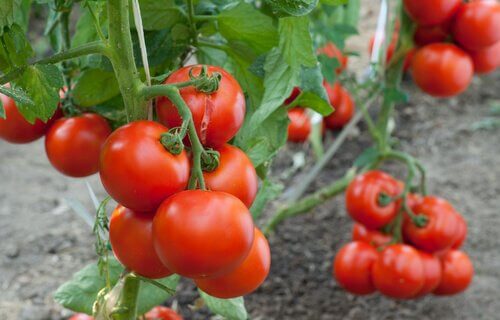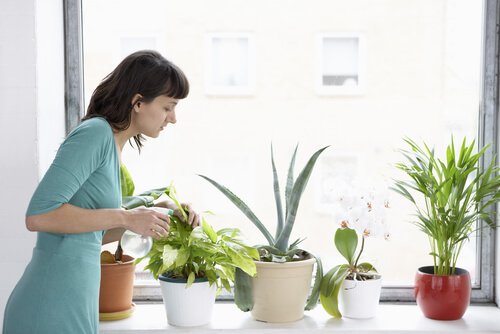Six Cinnamon Benefits for Plants

Cinnamon has been used for thousands of years in both gastronomy and natural medicine. However, few of us know that it’s also an excellent ally that keeps garden plants healthy without the need to use harmful chemicals. Find out below some of the cinnamon benefits on plants.
Although there are currently fertilizers and pesticides that help keep a garden in top shape, many have chosen to start using cinnamon as a substitute. Not only is it cheaper than conventional, commercial options, but it’s also 100% eco-friendly and safe.
Also, the best part is it will solve several problems, and as consequence, you won’t have to use specific ones for each problem.
Keep reading to find out in detail how you can turn these cinnamon benefits into your best gardening weapon.
Cinnamon Benefits for Garden Plants
Cinnamon powder has interesting applications in gardening. While we’ve all become used to keeping it exclusively in the kitchen, it’s actually very versatile in many other household tasks.
Do you want to keep the plants in your garden healthy? Find out below how you can use it.
1. Pest control

Instead of purchasing expensive, toxic chemical pesticides for your garden, use a little bit of cinnamon powder. Due to its penetrating aroma and properties, this ingredient keeps mosquitoes away from you, and pests away from feasting on your plants.
How to Use
- Take the amount of cinnamon powder that you consider necessary and spread it around the plants or any other place where bugs concentrate.
- Repeat every 2 or 3 weeks.
2. It’s anti-fungal
To keep garden plants healthy, it’s essential to have a product that prevents fungi. Fortunately, thanks to its anti-fungal and disinfectant compounds, cinnamon can protect plants against these microorganisms.
How to Use
- Sprinkle a little cinnamon powder on the areas of the plant that show obvious signs of mold or fungi.
- Repeat your application if they don’t disappear after a few days.
Read also: 8 Organic Ways to Get Rid of Ants
3. Protection of vegetables

No one wants their vegetables to develop diseases, especially when they’re still growing. The problem is that soil conditions and the proliferation of fungi can attack at any time. However, wonderful cinnamon can be used as a fertilizer option.
How to Use
- Spread a little cinnamon powder on the ground, just around the base of the plant.
- Use it once a week.
4. Cuttings maintenance
Currently, there are several commercial products for promoting rooting in cuttings successfully. You don’t have to spend money on them, however, just try this simple trick: apply cinnamon to the stem of the cutting before planting it.
If there are gardening problems that prevent you from getting a good result, another option is to make a fungicide recipe by combining cinnamon with aspirin.
Follow the steps below:
Ingredients
- 1 tablespoon cinnamon powder (10 g)
- 2 cups of water (500 ml)
- 2 ground aspirin tablets
Preparation
- Add all the ingredients in a container and stir until they’re well mixed.
- Let them sit for 12 hours and strain it to separate possible residues.
How to use
- Soak the cuttings in the liquid for two hours.
- Then, plant them as usual.
Surely you’ll be interested: Houseplants That Will Make You Healthier
5. Heal the wounds on your plants

After excessive pruning, plants may suffer cuts or wounds that tend to be infested with fungi and other harmful microorganisms. Fortunately, to prevent this problem, you can give them a protective layer of cinnamon.
How to use
- Sprinkle some cinnamon on the affected parts of the plants to speed up their healing process.
6. Indoor plants
Of course, cinnamon can also be used as an alternative to keep indoor plants healthy. Thanks to its properties and nutrients, it can prevent them from withering or from getting sick. In addition, it also prevents aphids.
Mode of use
- Sprinkle a small amount of cinnamon powder directly in the pots of the plants.
- Repeat the application to maintain the effect after two or three weeks.
As you can see, cinnamon has interesting benefits for keeping garden plants healthy. If you haven’t tried it yet, use it to replace those toxic chemicals that are so harmful to the environment.
All cited sources were thoroughly reviewed by our team to ensure their quality, reliability, currency, and validity. The bibliography of this article was considered reliable and of academic or scientific accuracy.
- American Chemical Society. “Cinnamon Oil Kills Mosquitoes.” ScienceDaily. ScienceDaily, 16 July 2004. www.sciencedaily.com/releases/2004/07/040716081706.htm
This text is provided for informational purposes only and does not replace consultation with a professional. If in doubt, consult your specialist.








